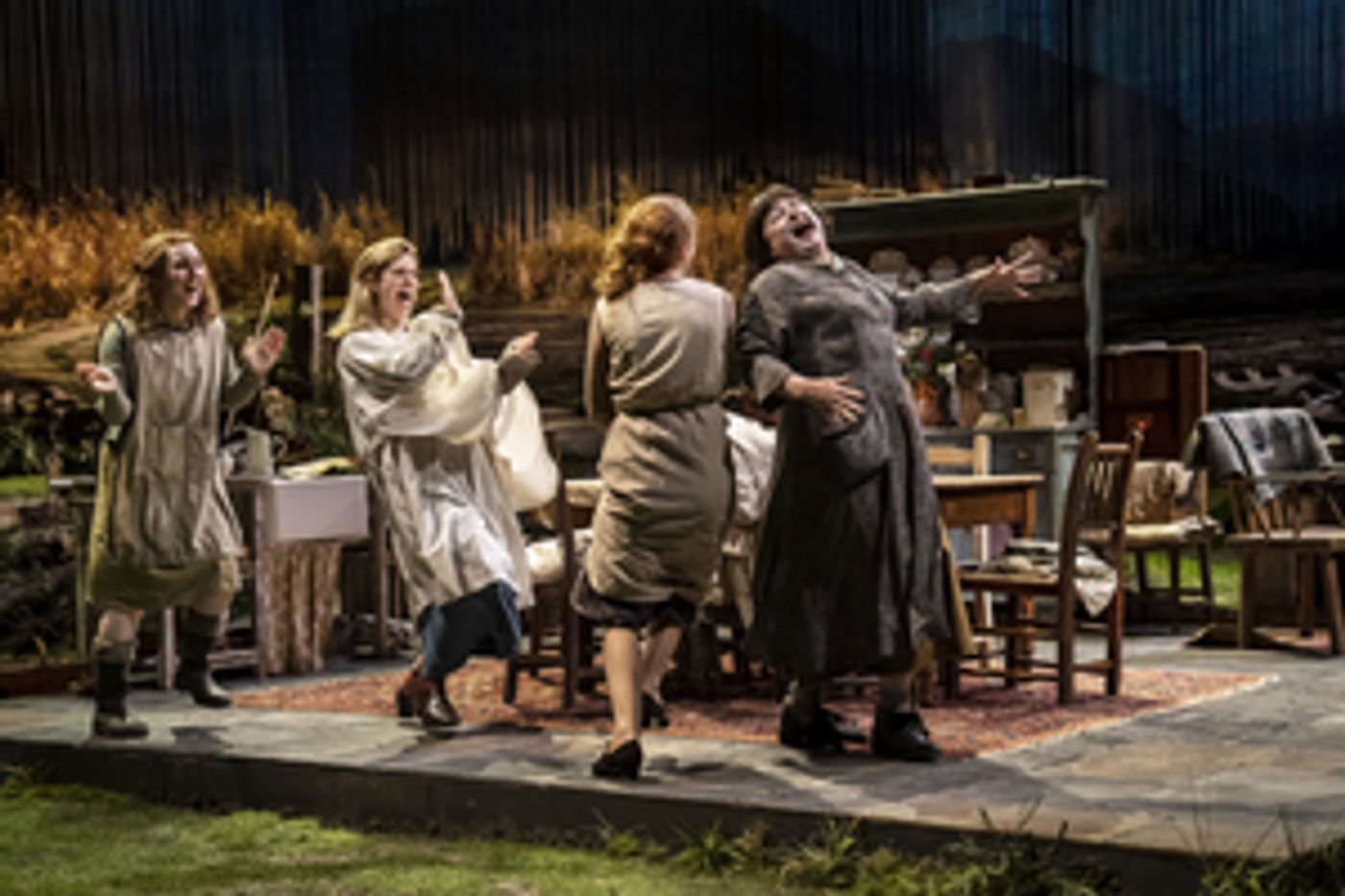Review: DANCING AT LUGHNASA, National Theatre
Classic Irish play channels the joy and sadness of five sisters' late summer 87 years ago

 A third of a century has passed since Brian Friel's part-autobiographical memory play was first produced at The National Theatre. Few countries have undergone quite so much change as Ireland, constitutionally and culturally, in that period, so the question hangs in the air - how do we see the multi award-winning play now?
A third of a century has passed since Brian Friel's part-autobiographical memory play was first produced at The National Theatre. Few countries have undergone quite so much change as Ireland, constitutionally and culturally, in that period, so the question hangs in the air - how do we see the multi award-winning play now?
The synopsis remains the same of course. Five sisters, all unmarried and, in the parlance of the time, getting on, hanker for excitement, for relief from the drudgery of Donegal life in August 1936.
Chrissie has a child, born out of wedlock (see - this terminology is catching) when a teenager whose charmer of a father, Gerry, visits occasionally, but provides nothing more than a glimpse of that most bittersweet of visions - what might have been. Kate, the eldest sister, brings in the only regular income as the nearby village's schoolteacher and is fearful of change and consumed with her self-appointed role as custodian of what's left of the family's reputation. That largely rests on the work of Father Jack, the oldest of the siblings, recently back from an African mission ministering to lepers, debilitated by malaria and acting strangely - "gone native" to the extent of forgetting his English and praising witchdoctoring rituals.
Maggie, woodbine in hand, has a joke ready when she wants one, but also when she needs one, diffusing the tension that swirls around the kitchen. Rose and Aggie knit gloves, bringing in a few shillings, but now threatened by a factory, the industrial revolution arriving in Ireland, 100 years late. Rose has learning difficulties and may be falling prey to a local man; Aggie protects her, seldom taking the opportunity to show her grace as a dancer or her infatuation with Gerry.
But dance the sisters do, celebrating the Celtic harvest festival of Lughnasa riotously, all the pent-up frustration (sexual, social, financial) momentarily released when the wireless intermittently sparks into life, even straitlaced Kate joining in. It's an outward manifestation of what's going on in their hearts and minds while their bodies are (usually) so constrained by their gender, their circumstances and their religion.
There's a touch of The Wicker Man in the sensual pagan counterpointing the repressed Christian, and an echo of Christ Stopped At Eboli in the gossamer thin veneer of Catholicism's sequestration of ancient rites. Wayne McGregor's joyous choreography really does say more in a few minutes than the script tells us in two and a half hours.
Though widely acknowledged as a classic play, the pace is slow and the alchemy of Chekhov's genius in making the mundane transfixing, is largely missing. Sometimes the excavation required to uncover the subtext is as effortful as that required to dig the peat that burns in the stove.
The performances are excellent, Siobhán McSweeney catching Maggie's wit and wisdom and Alison Oliver visibly aching with delight as Chrissie whenever Tom Riley's dandyish Gerry appears on the horizon. It was a brave, but misguided, decision to cast Ardal O'Hanlon as the lapsed priest, Father Jack. I tried to empty my mind of his unforgettable previous incarnation as a priest, but the voice brought it back - again and again. The issue is not a 1990s sitcom, but the many times I (and, I guess, others in the house) have loaded up Youtube clips to have a laugh when I needed it, especially during lockdown. Not fair to a fine actor, but I'm not sure he can ever play a priest without that mighty baggage in hand.
Tom Vaughan-Lawlor does what he can with the grown-up Michael, Chrissie's boy, but his long slow wander on to Robert Jones' striking but fussy set, followed by screeds of narration, sap the pace from the play, tilting a tragicomedy too far towards the melancholic and away from the carnivalesque.
Ultimately one wonders what director, Josie Rourke, intended to make of the work in its second production at The National Theatre, having also played at The Old Vic in 2009 and around the world. Since 1990, the Church's grip on Ireland has much diminished, the opportunities for women increased, people with disabilities demanding not protection but empowerment and we've all had a bitter taste of social isolation. If one can take the technical quality of a production on one of the world's greatest stages as a minimum, one is left with a sense of "Meh" about much else.
Perhaps the Irish film industry, recently so successful on the international festival and award circuits, shows a more nuanced approach, bolder in conception and execution, in reflecting Ireland's complicated past, while telling stories of universal relevance to today.
Dancing at Lughnasa at The National Theatre until 27 May
Photo Credit: Johan Persson
Reader Reviews

Videos

